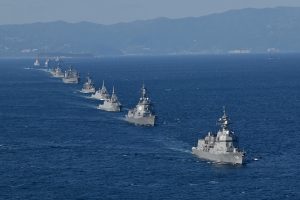The Japan Maritime Self-Defense Force (JMSDF) hosted the International Fleet Review (IFR) for the first time in 20 years to mark the 70th anniversary of its founding. Twenty MSDF ships and submarines as well as 18 vessels from the United States, Australia, India, and nine other countries took part in the review in Sagami Bay, south of Tokyo, on November 6. Prime Minister Kishida Fumio reviewed JMSDF vessels and those from other countries sailing in formation from the deck of JS Izumo (DDH 183), one of four Japanese helicopter carriers, which I had also boarded to cover the multinational fleet review.
Here are three take-aways from the major naval event.
Participation of Like-minded Pacific Countries
At the international fleet review, there was a strong presence by Western-style democracies that share the same values with Japan. Australia was the most notable among those like-minded nations. The Southern Hemisphere nation accounted for four of the 18 ships that participated from overseas. This represents the deepening of the bilateral relationship as a “quasi-alliance” in the face of China’s increased assertiveness in the East and South China Seas as well as the Indo-Pacific theater. On October 22, Kishida and Australian Prime Minister Anthony Albanese signed a new joint security declaration, the first since 2007.
Canada, another Pacific nation, also dispatched two ships to Japan. India also sent two ships. South Korea, which regards the JMSDF’s use of the Flag of the Rising Sun as a thorny symbol of Japan’s colonialism, eventually sent one logistics support ship, the Soyang, to Japan for national security purposes in the wake of North Korea firing off ballistic missiles at an unprecedented pace.
On the other hand, the JMSDF did not invite Russia, which is still actively occupying territory in Ukraine. Meanwhile, China decided not to participate despite Japan’s invitation.
What was interesting is that Pakistan also brought in two ships. The South Asian nation, which has a strong sense of rivalry with India, is believed to have intentionally sent the same number of vessels to Japan that India did.
Lack of Presence of European Countries
The second takeaway is the lack of presence by European naval forces, which should have sent some ships. A Royal British Navy vessel was scheduled to participate, but it was canceled at the last minute due to a tropical cyclone that lashed the Philippines. Curiously, many Southeast Asian countries – such as Singapore, Malaysia, Thailand, Indonesia, and Brunei – managed to participate in the IFR, while the U.K. vessel was stuck on the way to Japan.
France, which has territories in the South Pacific, including Polynesia and New Caledonia, has declared itself to be an Indo-Pacific nation. However, France only dispatched a Falcon 200 maritime surveillance aircraft to the IFR and did not send any naval vessels. Moreover, this patrol plane was initially sent to take part in regular surveillance missions to enforce U.N. sanctions against North Korea, rather than participating in the IFR. Germany also did not send any ships or aircraft. No other Europeans, such as the Netherlands, participated. Therefore, it can be said that the participation of Europeans is practically zero.
Admiral Pierre Vandier, chief of staff of the French Navy, is currently visiting Tokyo to attend the 18th Western Pacific Naval Symposium (WPNS) being conducted on November 7 and 8 in conjunction with the IFR. Vandier held a press conference in Tokyo on November 7. Asked why the French navy did not send any vessels to Japan, he said the timing of the deployment was not right.
“The reason France did not dispatch a naval vessel this time is that although there are two bases in New Caledonia and Polynesia [in this region], but both bases have only two patrol boats and one frigate, so we have very limited assets,” the top officer in the French navy said.
“Dispatches from mainland France are scheduled to be deployed in the region, usually from November to June, except for emergencies, so the timing of the fleet review was a little early,” he added.
Strong Presence of the US Aircraft Carrier Ronald Reagan
Right after attending the IFR in Sagami Bay on November 6, Kishida flew by helicopter to board the USS Ronald Reagan, which was sailing nearby. During the IFR, Ronald Reagan was sailing side by side with JS Izumo for long periods of time by maintaining a certain distance, or cruising from afar. Although the JMSDF’s official position was that the US aircraft carrier “was just passing by chance” and the close sailing was “just a coincidence,” the Ronald Reagan practically participated in the IFR.
In fact, former Prime Minister Abe Shinzo also stepped aboard the Ronald Reagan during a naval review in 2015. Kishida must have wanted to follow in the footsteps of Abe and demonstrate the strength of the Japan-U.S. alliance by boarding the U.S. aircraft carrier.
However, one of the main purposes of the international fleet review is to deepen broad-ranging international goodwill with many other countries. In order not to overemphasize the Japan-U.S. military alliance, it seems the Japanese government is pretending the Ronald Reagan’s appearance was a “coincidence,” but this required giving labored explanations to the media and the Japanese public as the presence of the U.S. carrier was very strong.
The major purpose of hosting the IFR should be to deepen the Japanese people’s understanding and trust in the SDF. The government and the Ministry of Defense in Tokyo, which make political decisions, should explain this matter to the Japanese people sincerely and honestly.













